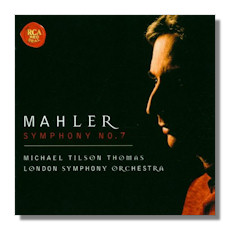
The Internet's Premier Classical Music Source
Related Links
- Mahler Reviews
- Latest Reviews
- More Reviews
-
By Composer
-
Collections
DVD & Blu-ray
Books
Concert Reviews
Articles/Interviews
Software
Audio
Search Amazon
Recommended Links
Site News
 CD Review
CD Review
Gustav Mahler

Symphony #7
London Symphony Orchestra/Michael Tilson Thomas
RCA Victor Red Seal 09026-63510-2 DDD 2CDs 48:46, 32:19
Even though the music of Gustav Mahler has not been central to Michael Tilson Thomas's discography, the elusive Seventh Symphony has taken him to a new peak in what is already a distinguished career. Because this is the least familiar of Mahler's nine completed symphonies, it was clever of Tilson Thomas to plant his flag here, where the competition seems thinner. Nevertheless, conductors such as Leonard Bernstein and Giuseppe Sinopoli have done memorable Sevenths, and Tilson Thomas's new version is not wide of the standards that they set.
As I repeatedly listen to this new recording, it is Bernstein who comes to mind. Bernstein's two recordings of the Seventh Symphony (one for Columbia and one for Deutsche Grammophon) brought out the conductor's best. Like Bernstein, Tilson Thomas ensures that the music's incipient strangeness is neither exaggerated nor forgotten. Both conductors are highly attentive to the endless textural details that distinguish a tolerable performance from an exciting one. The Seventh is full of uncanny colors and quirky ideas, particularly in the two "Night Music" movements, and Tilson Thomas realizes them without allowing them to interrupt the music's flow. I disagree with the statement that this symphony is a journey from night to day, and the hectic final movement (hectic, at least, in Tilson Thomas's conception) hardly seems like an unmitigated human victory. Indeed, a "planned disorder" seems to be just beneath the finale's surface, and Tilson Thomas is successful at making it work in the music's favor.
Tilson Thomas's relatively expansive tempos necessitate the use of two discs, but RCA is not passing the cost of the additional disc on to buyers. I feel like this symphony at times has been rushed in order to fit it on one CD, and I am glad that neither the conductor nor the label have been so pressured this time around.
Ian Bousfeld, who plays the crucial tenor horn solos, gets deserved recognition in the annotations. The entire London Symphony really is on top of things, however, and there's an tautness and an electricity to their playing, both in solo and ensemble passages, that is enviable.
This is not an easy symphony, and it may never be as popular as its sisters, but Tilson Thomas and the London Symphony have approached it with missionary zeal. The engineering (by Markus Heiland) is consistent with the quality of the performance.
Copyright © 1999, Raymond Tuttle


















